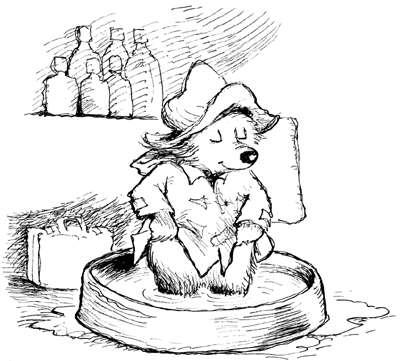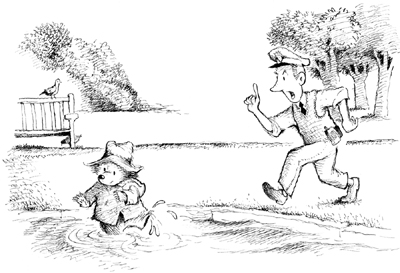Paddington Races Ahead (7 page)
Read Paddington Races Ahead Online
Authors: Michael Bond

“Perhaps I might leave cutting down and having one less until tomorrow, Mr Gruber,” he said.
“That sounds a very good idea,” said Mr Gruber. “I think I will join you.”

I
F IT HADN’T
been for the fact that apart from a slight breeze it was a particularly warm July morning, Paddington might not have stopped on his way to the market in order to bathe his feet. But the plastic padding pool of crystal clear water with chunks of ice floating in it was hard to resist. It seemed a very good start to the day. So when a man behind a makeshift counter invited him to make use of it he accepted the invitation without so much as a second thought.
Time passes very quickly when you are having fun, but it felt like only a moment or two before he heard a voice calling out to him.
He stared at the man behind the counter. “I owe you ten pounds!” he repeated hotly. “But I’ve only just got here.”
“You’ve ’ad your feet in the water for a good ten minutes,” said the man. “And it’s a pound a minute.”
“A pound a minute?” uttered Paddington. He could hardly believe his ears.
“It’s coming up to eleven now,” said the man.
“Eleven!” repeated Paddington in alarm.
“You ’eard,” said the man crossly. “What are you? Some kind of tame parrot… repeating everything I say?”
“But I’ve only got ten pence,” said Paddington. “And that has to last me until the end of the week.”
“Ten pence!” echoed the man. “Did I ’ear you say you’ve only got ten pence?”
“Now you’re doing it,” said Paddington.
“Doing what?” said the man.
“Repeating what I just said,” exclaimed Paddington.
He raised his hat politely. “I think it must be catching. I was on my way to see Mr Gruber when you asked me if I would like to bathe my feet. It’s a hot day, so it felt like a good idea, and…”
“Thirteen and counting,” broke in the man, looking at his watch. “I was assuming,” he continued, choosing his words with care, “that you’d read the sign over the pool before you took the plunge. It’s all there in black and white. Now I’ve got a good idea. I suggest you take your feet out of that water in double-quick time and ’op it. My fish are ’aving enough trouble as it is – threshing to and fro like they don’t know if they’re coming or going.”
Hearing the word ‘fish’, Paddington scrambled out of the blue plastic paddling pool as fast as he could and peered down at the water for the first time. Sure enough, a shoal of tiny black creatures were circling round and round in the very spot where he had just been standing.
“I wish I’d brought my fishing net with me,” he said.
“That would have been all I need,” said the man. “I’ve only just taken delivery of them
garra rufas.
Very valuable, they are. They’re from the other side of the world and they’ve got no teeth.”
“Oh dear,” said Paddington. “I should ask for your money back if I were you.”
“But that’s the whole point,” said the man. “They don’t bite, they suck. It’s the latest thing in what is known as the world of fish pedicure. Which is a fancy name for what is the same as manicuring fingers only it ’as to do with the feet. Them fish remove the dead skin from between people’s toes without damaging the ’ealthy skin underneath it like there’s no tomorrow. If you ask me they must have been ’aving trouble with your follicles.”
“My follicles!” repeated Paddington. “I’d better tell Mrs Bird.”
“Oh dear,” said the man. “’Ere we go again. Follicles,” he explained, “are the sunken bits you ’as between your toes. Bears’ follicles must be deeper than other people’s. I expect the fish ’ad trouble getting their little ’eads inside. Must be very frustrating. I bet some of them wished they’d been born with teeth after all.”
Glancing up, the salesman’s face suddenly cleared as he realised a small crowd had collected while they had been talking.
“Roll up, roll up,” he called, hastily changing his tune.

“Gather round everybody. This young bear gentlemen ’ere is what’s known as a trendsetter. Or he would ’ave been, except he’s ’aving trouble with ’is follicles.
“For that very reason I’m not charging him anything,” he added, giving Paddington a nudge, “and since I know ’e’s in an ’urry to be on ’is way, I suggest you form an orderly queue. . .”
As the crowd set about following the man’s instructions, Paddington took the hint and made good his escape.
Leaving a trail of wet footprints behind him, he hurried down the Portobello Road as fast as he could in order to tell Mr Gruber about his latest adventure.
“I sometimes think people see you coming, Mr Brown,” said his friend, as he busied himself getting the cocoa ready for their elevenses, while Paddington dealt with the buns. “Things do seem to happen when you’re out and about.”
“It’s a bit early in the day too,” said Paddington. “It’s only just past eleven o’clock.”
A thoughtful look came over Mr Gruber’s face as he settled himself down on the horsehair sofa at the back of the shop. “This hot weather isn’t good news when you’re trying to run a business,” he mused. “People want to be out and about, not stuck inside an antique shop. I had been toying with the idea of putting our deck chairs out on the pavement like we used to, but all this talk of dipping your feet into ice-cold water has given me an idea.”
He paused. “Seeing Jonathan and Judy are home for the summer holidays, perhaps you had better see what they feel about it first of all, but I think a nice peaceful picnic in the park this afternoon will do us all the world of good.”
“A picnic in the park!” exclaimed Judy, when Paddington rushed home to tell the others. “What a lovely idea. Trust Mr Gruber to invite us along too.” She got up off the lawn and brushed herself down. “I’d better make some sandwiches.”
“May I help,” asked Paddington excitedly. “Bears are good at sandwiches.”
Jonathan licked a forefinger and held it over his head. “There’s a nice breeze,” he announced. “I might take my kite. I haven’t flown it for years.”
He rushed upstairs and returned a moment or so later armed with a multicoloured object almost as tall as Paddington.

“It’s what’s known as a double butterfly kite,” he said. “The frame is made of balsawood and the rest of it is Japanese tissue paper. I made it myself,” he added proudly. “
And
I painted it!”
“I expect bears would be good at flying kites,” said Paddington hopefully.
Jonathan eyed him dubiously. “We’ll see,” he replied vaguely. “It isn’t always as easy as it might sound.”
“You wouldn’t want to be carried off by the wind,” said Judy, coming to her brother’s rescue.
“There’s no knowing where you might end up,” agreed Jonathan gratefully.
Both Mrs Bird and Mrs Brown were only too pleased to have the house to themselves, so Mr Gruber’s suggestion met with all-round approval, and it was a happy party that eventually set off early that afternoon.
Paddington gazed around with interest as they entered the park. There were all manner of things going on. To start with there was a children’s playground full of climbing frames, which looked very tempting. Then there were several outdoor restaurants; but best of all, there was a large lake with boats on it, so he made a beeline for that.
“I think I might test my follicles first of all,” he announced, as he dipped his toes into the water.

But once again it seemed as though it wasn’t meant to be, for his feet had hardly entered the water before a man in uniform emerged from behind a bush.
“What’s all this going on?” he asked severely. “Can’t you read?”
He pointed to a nearby sign emblazoned with the words: NO BATHING, FISHING OR DOGS ALLOWED IN THIS WATER in large letters.
“It doesn’t say anything about bears,” protested Judy, coming to Paddington’s rescue. “Or dipping your feet in the water, come to that.”
“That’s as may be,” said the man. “But it has to do with Health and Safety. Health on account of the fact that we don’t know where that young bear’s feet have been, and safety on account of the fact that some of the fish around here have got very sharp teeth and they might fancy partaking of a toe or two for their afternoon tea.”
Paddington hastily withdrew his feet from the water just as there was a splash of something breaking the surface nearby.
“See what I mean,” said the man. “That was a narrow squeak if ever there was one. Probably a passing pike with an eye on your digits.”
He glanced at Jonathan’s kite. “And the same applies to that contraption,” he said. “There’s a time and place for everything. What goes up must come down. And when that happens it might land on someone’s head.
“If I were you,” he added, not unkindly. “I’d take it somewhere quiet where you can’t be seen.”
“Oh dear,” said Mr Gruber, as the inspector turned on his heels and went on his way. “That wasn’t a very good start.”
“Don’t worry, Mr Gruber,” said Judy. “No matter what, they can’t stop us from having our sandwiches.”
“I know a good place for a picnic,” broke in Jonathan. “It’s where I used to go when I was small. Follow me…” And without further ado he led the way round the lake.
“We must be getting near the Open Air Theatre,” said Judy, when they reached the far side.
Paddington pricked up his ears. “I’ve never heard of a theatre in the open air before,” he said.
Jonathan pointed towards a poster. “Well, there you are,” he said. “They’re doing
Hamlet
today. The wind’s blowing the right way, so with a bit of luck you might be able to hear some of it.”
Paddington licked his lips. Privately, he thought Hamlet sounded like a small ham sandwich, but he didn’t let on. “What is it about?” he asked.
“Most of the play takes place in a castle called Elsinore,” said Jonathan. “And it’s very bloodthirsty. Hamlet’s father was King of Denmark and when he slew the King of Norway, his son vowed to avenge him.”
“Meanwhile,” said Judy, “Hamlet’s mother, Gertrude, marries someone called Claudius, who is none other than the brother of Hamlet’s father.”
“Then,” said Mr Gruber, “Hamlet’s father appears as a ghost and tells his son that he was in fact murdered by Claudius… and he must take his revenge.”
“It sounds very complicated,” said Paddington.
“That’s only the beginning,” said Jonathan. “There’s someone called Polonius, who is always in the way, so he has to go…”
